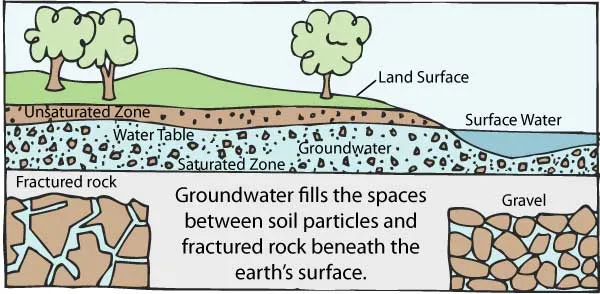Font size:
Print
The Deccan Plateau’s Groundwater Crisis
Groundwater crisis deepens in Karnataka’s hard rock terrain
Context: A recent study conducted by researchers from the Water, Environment, Land and Livelihoods (WELL) Labs in Chennai uncovers the stark reality of groundwater depletion in the Upper Arkavathy watershed, specifically in Aralumallige and Doddathumakuru gram panchayats near Bengaluru.

What is the Current Groundwater Situation in the Deccan Plateau?
- The Deccan Plateau, covering much of peninsular India, consists of hard rock aquifers (basalt and granite) with low porosity, relying on fractures and weathered zones for water storage.
- In Karnataka, about 99% of water needs depend on these hard rock aquifers.
- These formations provide limited water compared to sedimentary aquifers, which are more generous in flow.
Why is Groundwater Declining So Rapidly?
- Primary Causes:
-
- Intensive Agriculture: The region supplies vegetables, flowers, and exotic crops to Bengaluru, requiring heavy water use.
-
- Deep Borewell Dependence: Farmers rely on deep borewells beyond monsoon season. Drilling into granite creates microfractures, diverting rainwater away from shallow aquifers. This disrupts natural recharge, worsening long-term water retention.
-
- Falling Water Tables: Average borewell depth increased from 183m (2001-2011) to 321m (2011-2021). 55% of wells in Aralumallige failed, with 70% of drinking water wells drying up within 10 years.
-
- Secondary Factors:
-
- Encroachment of Water Bodies: Traditional tanks & lakes (like Aralumallige’s lake) are degraded or dried up. Even heavy rains (2022) failed to recharge the lake due to encroachment & soil erosion.
-
- Past Policies: Eucalyptus farming (now banned) worsened depletion due to high water consumption.
What Are the Consequences of Depleting Groundwater?
- Economic Strain on Gram Panchayats: Free electricity for farmers has led to excessive borewell drilling & high-power pump usage. Panchayats face huge electricity bills, forcing them to divert development funds to cover power dues. Struggle with revenue shortages and state tax pressures.
- Farmer Distress & Rural Migration: Small farmers spend ₹4-5 lakh per borewell, with no guarantee of success. Many lease land & migrate to cities due to failed wells & rising costs.
- Water Quality Issues (Less Critical Than Depletion): Nitrate levels exceed safe limits (50 mg/l), but people continue using wells. Only 2 out of 79 abandoned borewells were shut down due to fluoride contamination. Depletion, not pollution, is the main reason for well failures.
What Efforts Have Been Made to Address the Crisis?
-
Government Initiatives:
-
-
- Sujala Project: A groundwater recharge program, but with limited impact without sustainable farming.
- Jal Jeevan Mission: Funds piped water infrastructure & replaces failed borewells, but does not solve over-extraction.
-
-
Study Recommendations:
-
- Shift to Sustainable Farming: Reduce water-intensive crops.
- Financial Incentives: Panchayats should pay farmers for using less water & electricity.
- Revive Traditional Systems: Restore lakes, tanks, and rainwater harvesting.
- Stronger Local Governance: Policies must address root causes, not just fund infrastructure.


